Japanese snake tattoos are one of the most popular tattoo designs, not only in Japan but all around the world. The intricate details, bold lines, and striking colors make them a favorite among tattoo enthusiasts. But beyond their aesthetic appeal, these tattoos hold deep cultural and symbolic significance in Japan. In this article with Impeccable Nest, we will explore the meaning of Japanese snake tattoos.

History of Japanese Snake Tattoos
In Japanese mythology, the serpent is seen as a symbol of renewal, transformation, and protection. This symbolism is derived from the story of Yamata no Orochi, an eight-headed serpent slain by the god Susanoo. Additionally, some Japanese folklore suggests that snakes have the ability to take on human form and possess supernatural powers.
Japanese tattoos, or irezumi, were traditionally used to mark criminals and were seen as a shameful practice. However, during the Edo period (1603-1868), Japanese tattoos became popular among the working class and samurai. Some samurai even had elaborate full-body tattoos that depicted scenes from their favorite myths and legends, including those featuring snakes.
Today, Japanese snake tattoos are sought after for their intricate designs and rich cultural significance. They are often used to symbolize rebirth, wisdom, protection, and good fortune.

Japanese Snake Tattoo Meaning: Aesthetic Variations
In Japanese culture, the snake holds various symbolic meanings, and a snake tattoo can carry different interpretations based on its context and design. Here are some common meanings associated with Japanese snake tattoos:
Protection and Warding Off Evil
In Japanese folklore, snakes are often seen as powerful and protective creatures. They are believed to have the ability to ward off evil spirits and negative energies, making them a popular symbol of protection in Japanese culture. This belief is deeply rooted in Japanese mythology, where snakes are often depicted as guardians of sacred places and protectors of the gods.
As a result of this belief, snake tattoos have become increasingly popular in Japan as a way to symbolize protection. Those who choose to get a snake tattoo may do so because they believe it will provide them with an extra layer of spiritual protection from harm or negativity. It is also thought that having a snake tattoo can help to ward off bad luck and bring good fortune and prosperity.
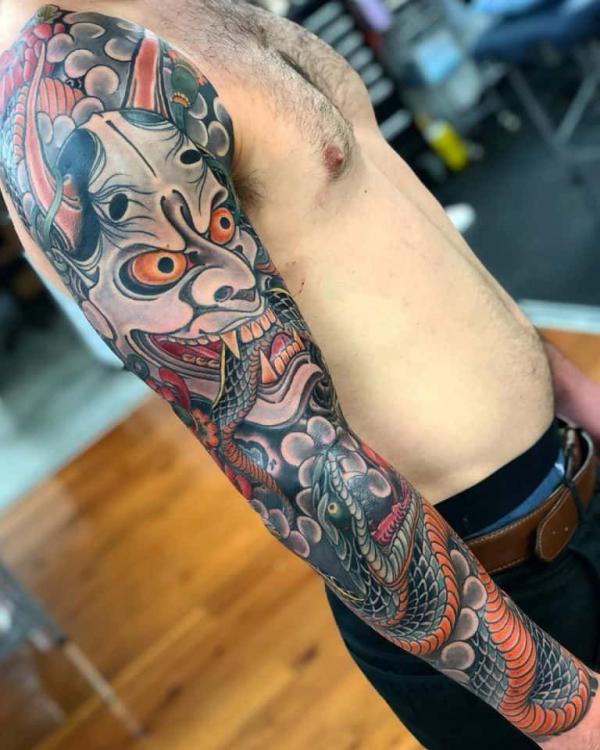
In addition to their protective qualities, snake tattoos also hold other meanings in Japanese culture. For example, they are often associated with wisdom, knowledge, and transformation. This is because snakes are able to shed their skin and emerge renewed and transformed, which is seen as a powerful metaphor for personal growth and change.
When getting a snake tattoo in Japan, it is important to choose the right design and placement. Different types of snakes may hold different meanings, and the placement of the tattoo on the body can also affect its significance. Some people choose to get a snake tattoo on their arm or back, while others opt for a more subtle placement, such as on their ankle or wrist.
Overall, the belief in the protective qualities of snakes in Japanese folklore has made them a popular choice for tattoos. Whether it is for spiritual protection or as a symbol of personal growth and transformation, a snake tattoo can hold deep meaning and significance for those who choose to get one.
Renewal and Rebirth
In Japanese culture, snakes hold a significant place in various aspects of life, including art, mythology, and spirituality. When it comes to tattoos, the Japanese snake tattoo carries rich and profound symbolism that goes beyond just the physical depiction of the reptile.
One of the main meanings associated with snakes is their ability to shed their skin. This natural process has led to associations with renewal, transformation, and rebirth. A snake tattoo can symbolize personal growth and development, shedding old habits or beliefs, and embracing new beginnings. It represents a person’s journey towards self-improvement and evolution.
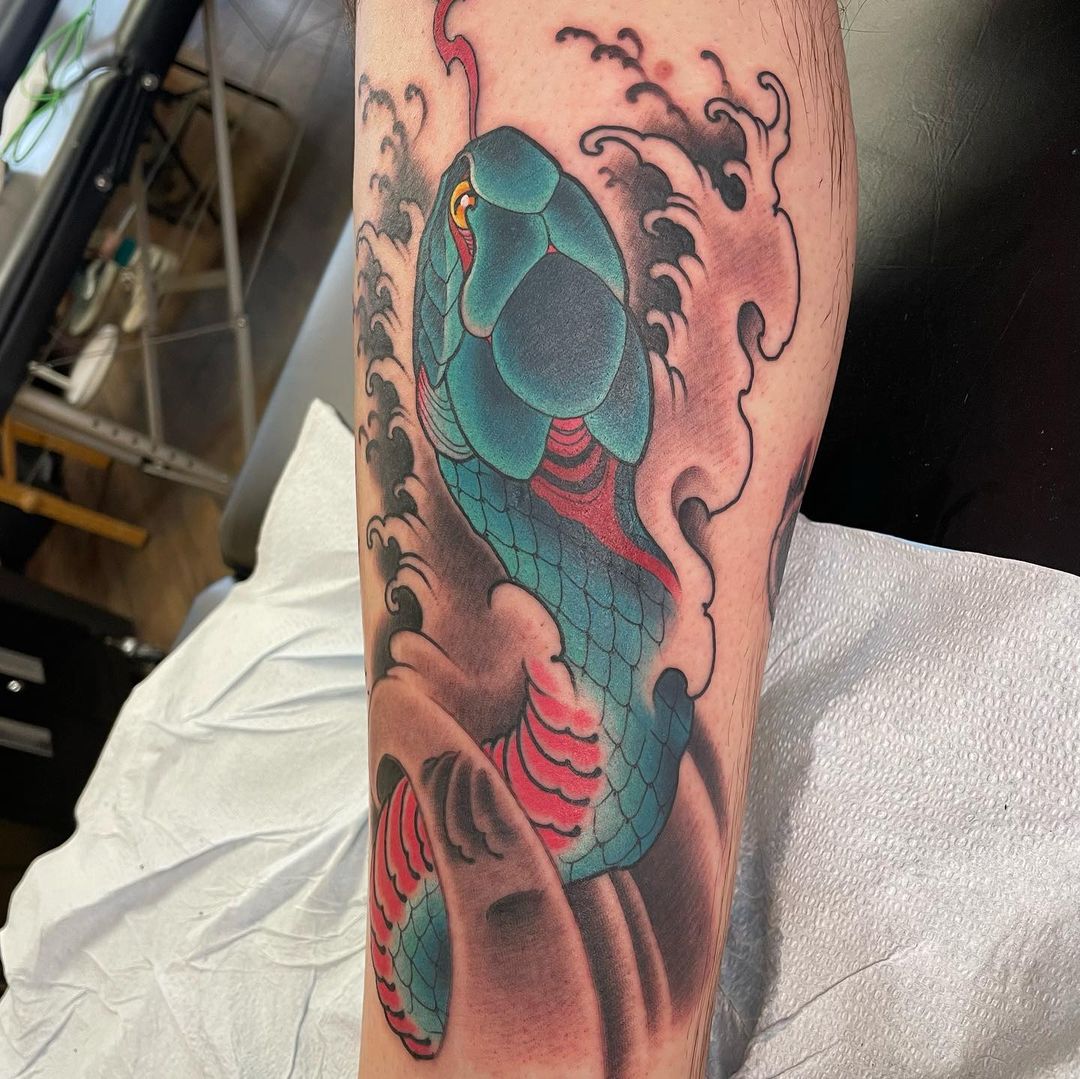
In addition to transformation, the Japanese snake tattoo also embodies strength and resilience. Snakes are known for their ability to adapt to different environments and survive in challenging conditions. Thus, a snake tattoo can represent the wearer’s toughness and perseverance in overcoming obstacles and challenges in life.
Moreover, snakes have been a symbol of protection and good luck in Japanese folklore. They are believed to ward off evil spirits and bring prosperity and fortune. Therefore, carrying a snake tattoo can offer a sense of security and safety to the wearer, as well as provide them with positive energy and blessings.
The design of the Japanese snake tattoo is also noteworthy. In traditional Japanese art, snakes are often depicted as ornate and intricate creatures, with elaborate patterns and details. These designs can include motifs such as flowers, waves, and clouds, which are all meaningful in Japanese culture. The combination of the snake with these symbols adds further layers of significance and depth to the tattoo.
In conclusion, the Japanese snake tattoo is a powerful symbol that represents personal transformation, strength, resilience, protection, and good fortune. It is a versatile design that can be customized to suit the wearer’s personality and story, making it a popular choice for those seeking a meaningful and impactful tattoo.
Wisdom and Knowledge
In Japanese mythology, snakes have been revered as wise creatures that possess secret knowledge. They are often associated with mystical and spiritual qualities, such as the ability to shed their skin and renew themselves. These beliefs have led to the snake becoming a popular symbol in Japanese culture, including in the form of tattoos.
If you choose to get a snake tattoo, it can represent your pursuit of wisdom, your desire for deeper understanding, or your connection to hidden truths. Snake tattoos are often seen as a way to tap into the mystical properties attributed to these creatures. They can also be a powerful reminder of the cyclical nature of life and the importance of shedding old ways of thinking in order to grow and learn.

The symbolism of the snake varies depending on the context and culture, but in Japan, it is often associated with strength, power, and transformation. The snake’s ability to slither and move in a fluid motion is often seen as a metaphor for adaptability and flexibility.
Additionally, in some Japanese myths, the snake is also associated with healing and medicine. For example, the Amabie, a legendary creature from Japanese folklore that resembles a mermaid with a serpent’s tail, is said to have appeared during epidemics to offer guidance and protection. As such, a snake tattoo can also represent your connection to the healing arts or your desire to help others.
In conclusion, a snake tattoo in Japanese culture represents wisdom, deeper understanding, and connection to hidden truths. Whether you choose to get a snake tattoo for its mystical qualities or as a symbol of your personal growth and transformation, it can be a powerful and meaningful addition to your body art.
Balance and Duality
In Japanese culture, snakes hold significant symbolism and are often portrayed in various art forms, including tattoos. These tattoos usually depict the serpent in an intricate and detailed design, emphasizing the snake’s characteristics and qualities.
The Japanese snake tattoo meaning can vary depending on the context and the individual’s interpretation. However, generally speaking, snakes represent duality, transformation, wisdom, protection, and healing. The snake’s ability to shed its skin and emerge anew is associated with transformation and rebirth, making it a popular choice for those seeking personal growth or change.
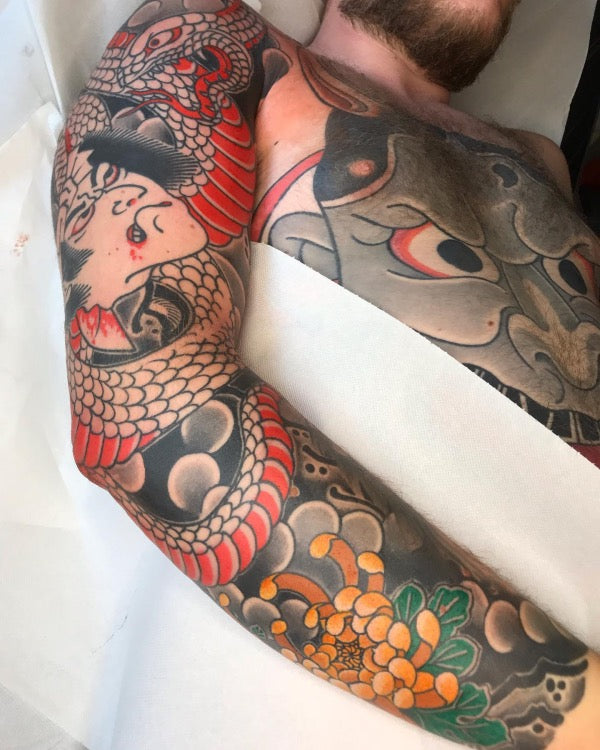
Additionally, the snake’s reputation for being both venomous and medicinal further solidifies its dualistic nature. In some cultures, snake venom is used for medicinal purposes, while in others, it is considered lethal. This dichotomy serves as a reminder that even the most dangerous things can have positive uses and attributes.
In Japanese mythology, Orochimaru is a snake god who embodies this duality. He is depicted as a powerful and cunning creature who can bring both good and bad fortune to those he encounters. Orochimaru’s legend is often associated with the concept of balance between opposing forces, such as life and death, light and dark, and good and evil.
Therefore, a Japanese snake tattoo can represent the idea of balancing opposing forces or finding harmony between seemingly disparate elements. It can also symbolize protection against evil or negative energy and serve as a talisman to ward off harm.
In conclusion, the Japanese snake tattoo meaning is complex and multifaceted, representing duality, transformation, wisdom, protection, and healing. The snake god Orochimaru is a significant figure in Japanese mythology, embodying these qualities and serving as a reminder of the importance of balance and harmony in life.
Guardianship
In Japanese culture, snakes have been regarded as powerful and symbolic creatures for centuries. They are often associated with various themes such as fertility, transformation, wisdom, and longevity. In addition, snakes are also believed to be protectors of hidden treasures or sacred places.
The significance of the snake as a symbol in Japanese tattoo art can be traced back to ancient times when Japanese warriors adorned their bodies with tattoos as a sign of strength and courage. The design often represented their personal beliefs, cultural values, or spiritual convictions.
A snake tattoo can hold different meanings depending on its placement, size, and design. For example, a small snake tattooed on the wrist might symbolize protection or strength, while a larger serpent coiled around the arm could represent transformation or rebirth. In some cases, a snake tattoo might reflect the wearer’s role as a protector or guardian of something valuable, such as family or homeland.
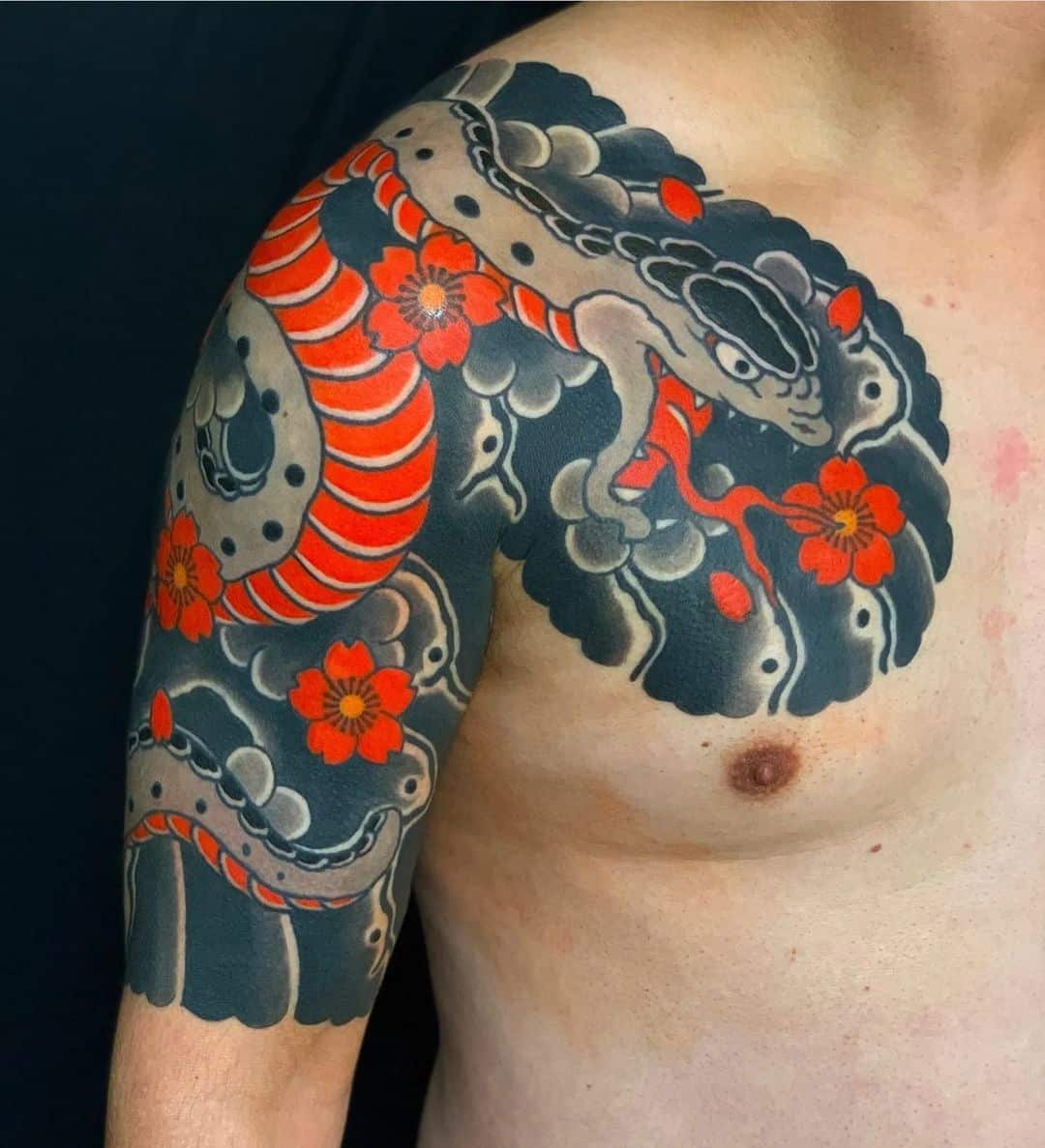
Furthermore, the color of the snake tattoo can also affect its meaning. Black or grey snakes are usually associated with death or danger, while green or blue snakes might represent healing or tranquility. A red snake, on the other hand, might signify passion or power.
In conclusion, the Japanese snake tattoo carries a rich and complex symbolism that reflects the wearer’s personality, aspirations, and beliefs. Whether it represents protection, transformation, or spiritual significance, this iconic design has become a popular choice for those seeking to express themselves through body art.
Sexuality and Passion
In Japanese culture, snakes have been a popular subject for tattoos for centuries. The Japanese snake tattoo, or “hebi irezumi,” holds a variety of meanings and interpretations. Due to their distinctive appearance and mythical symbolism, snakes are often associated with transformation, fertility, and power.
One of the primary meanings behind Japanese snake tattoos is sexual energy. Snakes are inherently phallic in shape and can represent masculine virility and potency. The serpent’s slithering motion and hypnotic gaze can also evoke sensuality and passion. A snake tattoo might symbolize the wearer’s connection to their primal desires or their embrace of their sexuality.

Another interpretation of the Japanese snake tattoo is transformation. In Japanese mythology, the serpent is seen as a creature that undergoes metamorphosis by shedding its skin. This process represents renewal, rebirth, and growth. A snake tattoo may be chosen as a symbol of personal transformation or as a reminder to embrace change.
Japanese snake tattoos can also represent fertility and abundance. In ancient Japanese folklore, the serpent was revered as a sacred creature that brought prosperity and good fortune. It was believed that snakes had the power to create life and bring about abundance. A snake tattoo might therefore be chosen as a talisman for prosperity, success, and wealth.
Overall, the Japanese snake tattoo holds a complex web of cultural and symbolic meanings. Whether chosen for its sexual connotations, transformative symbolism, or auspicious associations, a snake tattoo is a powerful and meaningful expression of identity and self-expression.
Cultural and Mythological Meanings
Japanese mythology and folklore are rich with snake-related stories that have been passed down through generations. One of the most famous tales is the story of Yamata no Orochi, a fearsome eight-headed serpent that terrorized Japan until it was slain by the god Susanoo.
According to the myth, Yamata no Orochi demanded a sacrifice of one of the daughters of the family who lived nearby every year. However, when Susanoo learned of this, he offered to help and devised a plan to defeat the serpent. He tricked Yamata no Orochi into drinking vast quantities of sake until it became so drunk that he was able to easily slay it.
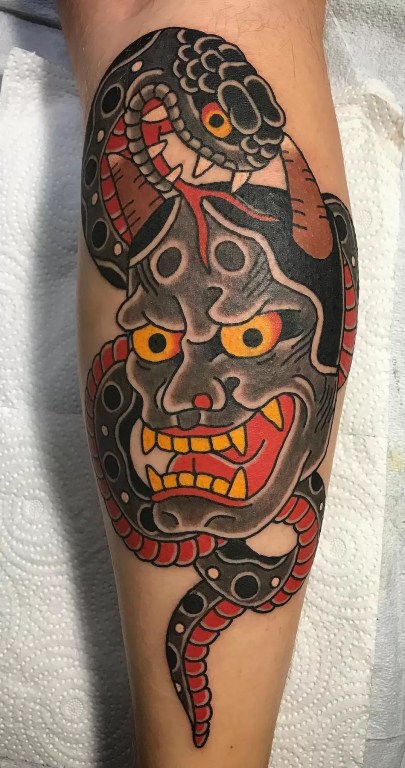
The tale of Yamata no Orochi is just one example of how snakes are portrayed in Japanese mythology and folklore. In many cases, they are seen as powerful and dangerous creatures, but also often associated with supernatural powers and wisdom. For instance, the goddess Benzaiten, who is revered as the patroness of music and art, is often depicted accompanied by a white snake.
In Japanese culture, tattoos have long held significant meaning and symbolism. Many people choose to get snake tattoos because they represent strength, power, and wisdom. The tale of Yamata no Orochi, in particular, may inspire individuals to get a tattoo featuring an eight-headed serpent to symbolize their own power and prowess.
Additionally, snake tattoos can also represent transformation, as snakes are known for shedding their skin and undergoing metamorphosis. This idea of rebirth and renewal is a common theme in Japanese mythology, with many tales featuring characters who undergo radical transformations to become more powerful or wise.
As with any tattoo, it’s important to thoroughly research the symbolism and cultural significance associated with your chosen design, especially if you are drawing inspiration from a specific culture’s mythology or beliefs. Additionally, consider how the chosen snake tattoo design aligns with your own personal beliefs, experiences, and aspirations.
Designs of Japanese Snake Tattoos
There are many different designs of Japanese snake tattoos, each with its own unique symbolism. Here are some of the most popular ones:
Hannya Snake Tattoo
This design combines the Hannya mask with a snake, creating a powerful image of transformation and protection. The Hannya mask represents a jealous female demon who transforms into a serpent, while the snake represents rebirth and renewal.
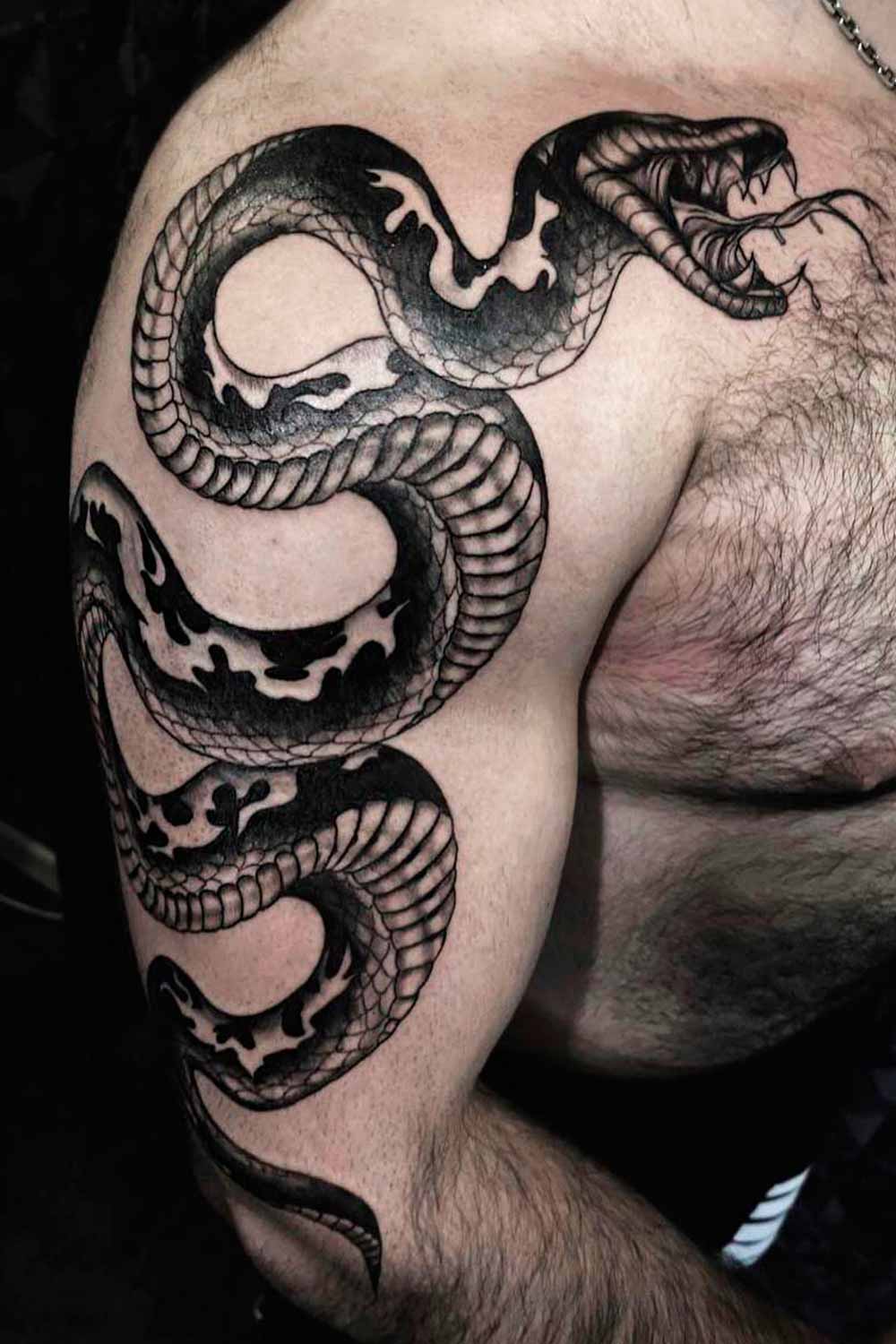
Dragon Snake Tattoo
Dragons and snakes are both powerful mythological creatures in Japan. A dragon snake tattoo combines the two, representing strength, wisdom, and good fortune.

Geisha Snake Tattoo
This design features a geisha holding a snake, symbolizing her control over the creature’s power. Geishas are known for their beauty, grace, and intelligence, while snakes represent danger and unpredictability.

Koi Snake Tattoo
Koi fish are also popular tattoo designs in Japan, symbolizing perseverance, determination, and courage. A koi snake tattoo combines the two creatures, representing adaptability and resilience.
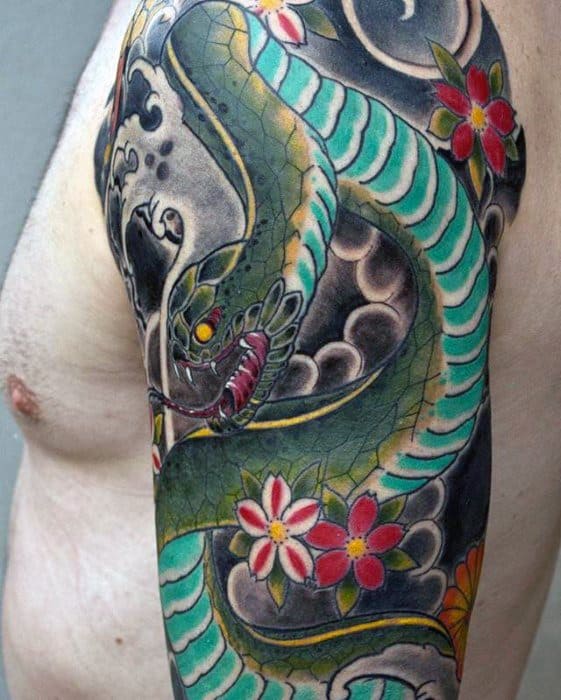
Yin Yang Snake Tattoo
This design features a snake coiled around the yin yang symbol, representing balance and harmony. The yin yang symbolizes the interconnectedness of all things, while the snake represents transformation and renewal.
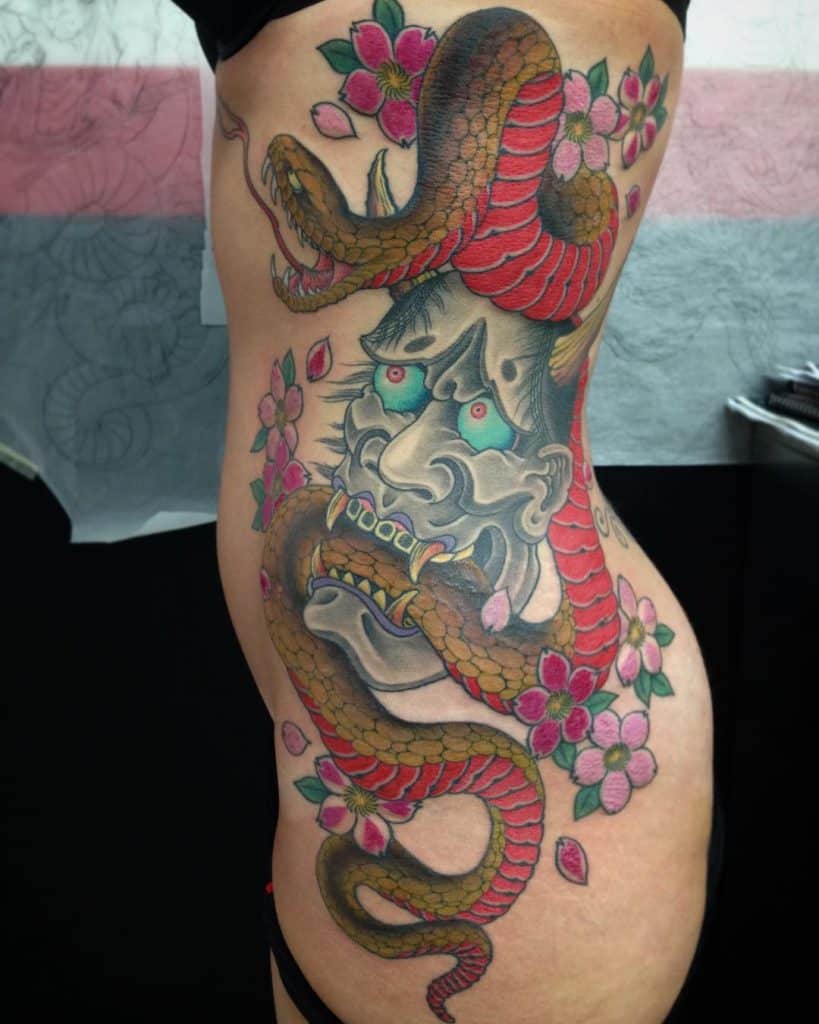
Conclusion
Japanese snake tattoos are rich in cultural and symbolic significance, representing strength, wisdom, and renewal. Whether you choose a Hannya snake tattoo or a yin yang snake tattoo, each design has its own unique power and meaning. If you are interested in getting a Japanese snake tattoo, be sure to do your research, find a reputable artist, and approach the design with respect and sensitivity. Remember, a tattoo is not just a piece of art – it is a reflection of your values, beliefs, and identity.

I am Harvey Berry, a tattoo enthusiast who has immersed himself in the diverse world of ink, passionately exploring the beauty and artistry within each tattoo. My mission extends beyond uncovering the aesthetics of tattooing; it involves sharing in-depth knowledge across all aspects of this art form.
Fueled by genuine curiosity and love for every facet of tattooing, I have diligently crafted well-researched articles, with a special focus on the Tattoo Meaning of Impeccable Nest section. Here, my aim is to help the tattoo community gain a deeper understanding of the meanings and values embedded in each tattoo.
One of my primary goals is to encourage responsible decision-making when it comes to getting inked. I recognize that choosing to get a tattoo is a significant personal decision that requires careful consideration. Hence, I provide diverse resources covering the meaning of tattoos, the tattooing process, aftercare tips, and other valuable information.
Whether you are a seasoned tattoo enthusiast or embarking on your first exploration of the world of body art, I aspire to be a reliable resource for you at every step of your journey. I hope that my extensive knowledge of tattoos, especially in the Tattoo Meaning section, will assist you in finding inspiration to express yourself through the art of tattoos.
